India's domestic airlines go 'ultra low' on ticket rates to bring back travellers
With COVID-19 putting off fliers and rates already at lowest ever, will this work?

Also In This Package
Dubai: For some of India’s low-cost airlines, going ‘ultra-low’ on ticket rates seem to be one way of getting back travelers once lockdowns and COVID-19 infect numbers ease.
GoFirst has announced a full-scale revamp and embrace the ‘ultra-low cost carrier’ operating model. It will take time for this to show up on the industry’s radar, because India’s carriers were offering some of the cheapest flight tickets – even before COVID-19 showed up.
Domestic traffic - once a major lifeline for airlines such as Indigo, Spicejet, and Wadia Group-owned GoFirst (earlier known as GoAir) - has dried up due to state-level lockdowns. Passengers carried by domestic airlines between January and April fell nearly 12 per cent year-over-year to 291,000.
“Domestic traffic has sharply reduced due to local lockdowns and fear of contracting the virus - I would assume the excess aircraft are grounded,” said Sanjiv Kapoor, former Chief Operating Officer at SpiceJet. “The only silver lining has been cargo and charters. Some airlines have done better than others at going after this… for example, SpiceJet.”
Not so new
Air Asia India had gone for a similar ultra-low strategy when it first entered in 2014, but was forced to change and be more like other airlines. There remain tremendous challenges in following a classic ULCC strategy in India.
“Airlines like IndiGo are already as ULCC as one can be in India,” said Kapoor. “However, it seems GoAir is going after an even more price-sensitive segment, forgoing corporates, which means it is going ULYC – ‘ultra low yield carrier’.”
Air India breach
As for India's national airline Air India, the problems just can’t seem to go away. It reported a data breach incident which affected about 4.5 million passengers. The national carrier said the breach involved personal data, such as name, contact information, passport information, ticket information and credit card data.
This further complicates a potential sale of the struggling airline. “The breach highlights the risk of ‘unknown unknowns’ that a buyer would have to deal with,” said an industry source. “While data breaches have hit other airlines in the past and is not unique to Air India, the time it has taken them to reveal the breach - and the extent of it - is a bit of a worry.”
Sign up for the Daily Briefing
Get the latest news and updates straight to your inbox









